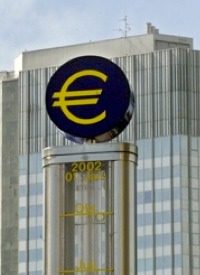
But rather than calming investors, the announcement only sparked more confusion and turmoil. Follow-up reports added fuel to the fire.
Citing traders, several news outlets claimed that the central bank bought Irish and Portuguese bonds on August 4 — not Spanish or Italian debt as was expected. Ireland and Portugal, of course, have both received hundreds of billions in bailouts already.
Growing problems in Spain and Italy, however, have not yet been addressed. And the financial footing of those two nations is what is really causing serious concern at the moment.
The reasoning behind the odd ECB purchases left analysts scratching their heads. And considering plunging stock prices and increased turmoil in debt markets, the new plan is already being heavily criticized.
“What on earth is the ECB playing at? It is almost as if policy makers are deliberately conspiring to bring the crisis to a head," noted economic and finance analyst Jeremy Warner. “If that's the intention, they are certainly succeeding.”
Berenberg Bank economist Holger Schmieding also blasted the approach. "If that is the ECB response, it's like the fire brigade responding but driving to the wrong place," he told Reuters. "It doesn't douse the fire and harms the credibility of the fire brigade."
Some experts, however, predicted that the central bank would eventually yield to pressure and begin purchases of Spanish and Italian bonds. That’s because absent drastic measures to rescue the two nations — among the largest economies using the euro — the future of the European single currency itself would again be called into question.
“The ECB is the only one now to stop this and the pressure is huge on ECB as this will affect the whole world," chief analyst Allan von Mehren of Danske Bank told MarketWatch, noting that a “massive policy reaction,” including central bank purchases of Spanish and Italian bonds, was likely due to growing market turmoil.
ECB boss Jean-Claude Trichet admitted during his monthly press conference that “uncertainty is particularly high,” but he refused to say whether the central bank was already secretly bailing out the governments of Spain and Italy. He did note, however, that the door was open for more economic “stimulus” via bond purchases.
But the central bank’s decision to resume its debt-buying program — supposedly halted more than four months ago — was not unanimous. According to news reports, significant internal opposition to the plan came from Germany’s Bundesbank President Jens Weidmann and others. But the divisions only left investors even more concerned.
Trichet also told reporters that the ECB would continue lending money to European banks while keeping its key interest rate at 1.5 percent. He noted that the economy had endured a “deceleration” of growth in recent months.
But despite Trichet’s tepid forecast of continued moderate growth, markets did not react favorably to the news conference. The euro plunged against other currencies on Thursday and European stocks performed even worse than American and Asian markets. Spanish and Italian stocks were among the worst.
Meanwhile, the European Union’s bailout fund is facing big problems of its own. Less than a month after yet another massive bailout was approved for the socialist Greek government, European Commission President Jose Manuel Barroso urged euro bigwigs to increase the size of the wealth-transfer mechanism yet again.
But analysts cautioned that such a move would be disastrous. “We're looking at such huge amounts, the bailout fund could end up running over a trillion euros," said Dr. Richard Wellings of the Institute for Economic Affairs, noting that a bailout or a default for Italy was almost inevitable.
Wellings blamed the "failed" euro experiment for the turmoil. “Obviously if you have a one-size-fits-all interest rate over a huge geographical area you’re going to inflate these different bubbles all over the region and it’s going to end up in tears,” he told RT in an interview. “The whole system is fundamentally flawed.”
What is really happening with the bailout, according to critics, is that a default is being postponed until all of the toxic bonds are off-loaded from the balance sheets of private banks and onto the backs of European taxpayers. Once that is accomplished, governments — especially Greece — will default and leave the public holding the bad debt.
And rather than strike at the root of the problem — central banking, integration, and big government — the economic crisis in Europe is being used to further centralize economic and political control over member states. But despite the refusal of Europe’s elite to even consider the prospect, many analysts still expect the EU and the euro to eventually crumble under the brewing storm.
While the euro was taking a beating, however, the Swiss Franc, gold, silver, and other assets have been surging as investors seek a safe haven. Switzerland’s central bank recently moved to curb the dramatic increase in the Swiss Franc relative to other currencies. But gold and silver are expected to continue rising if economic trends are not reversed.
Meanwhile, stocks around the world plunged over the last two days. The U.S. economy, like Europe’s, is also facing massive and growing systemic problems. All of the chaos has analysts ramping up warnings that the world is headed for a second crisis — possibly much more serious than the recent “recession.”
Of course, central-bank money creation and government bailouts will never solve the problems wreaking havoc on global markets. Those measures merely delay the inevitable while ensuring that the future crisis will be even worse.
What is needed, according to economists and experts with a solid track record, is sound money and smaller governments. But for now, analysts say the future does not look bright.
Photo of European Central Bank: AP Images



